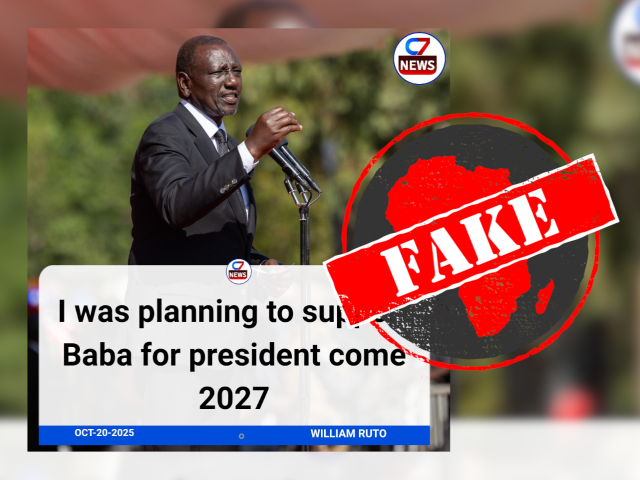Listen to the article
#
Fact Check: No Evidence President Ruto Pledged Support for Odinga in 2027 Election
A viral graphic circulating on social media platforms claiming that Kenya’s President William Ruto has announced plans to support opposition leader Raila Odinga in the upcoming 2027 presidential election has been debunked as false.
The misleading graphic, which has gained significant traction online, purportedly shows President Ruto declaring his intention to back his longtime political rival in the next general election. However, a thorough investigation by Africa Check has found no credible evidence supporting this claim.
“Despite the claim’s newsworthiness, we found no reports from credible media outlets about it,” noted Africa Check in their analysis. “If it were a credible claim, both local and international media would have picked up such a development.”
The fact-checking organization traced the origin of the graphic to “Channel 7 News,” a source with a documented history of publishing fabricated quotes attributed to prominent Kenyan political figures. This pattern of misinformation suggests the current claim follows the same deceptive template.
Kenya’s political landscape has been characterized by shifting alliances and rivalries, with Ruto and Odinga representing two significant power centers. The 2022 election saw Ruto narrowly defeat Odinga in a hotly contested race that went to the Supreme Court before being settled. Any genuine announcement of support between these political rivals would represent a seismic shift in Kenyan politics.
Contrary to the fabricated graphic’s claims, President Ruto’s recent public statements indicate he remains focused on his own political future. The President has been actively strengthening political alliances and has expressed confidence in his prospects for the 2027 election. In multiple public forums, Ruto has described his re-election campaign as “unstoppable,” directly contradicting the narrative presented in the false graphic.
Political misinformation has become increasingly prevalent in Kenya’s digital spaces, particularly as the country navigates the early stages of the current administration and looks ahead to the next electoral cycle. Social media platforms have become battlegrounds for political narratives, with fabricated content often designed to create confusion or shift public perception.
The spread of such misinformation poses significant challenges for Kenya’s democratic processes. False claims about political alliances can mislead voters, distort public discourse, and undermine trust in both media and political institutions. This particular fabrication appears designed to suggest political instability or uncertainty in President Ruto’s administration.
Media literacy experts recommend that Kenyans verify political claims through established news organizations and official government communications channels before sharing content on social media. The proliferation of deceptive political content underscores the importance of critical information consumption habits among citizens.
Africa Check’s investigation concludes that “posts claiming Ruto said he had planned to support Odinga’s bid for president in 2027 should be ignored,” as they represent yet another instance of manufactured political content designed to mislead the public.
As Kenya’s political landscape continues to evolve heading toward the 2027 election cycle, accurate information will be crucial for citizens making informed decisions about their country’s future leadership. Vigilance against misleading content remains essential for the health of Kenya’s democracy.
Fact Checker
Verify the accuracy of this article using The Disinformation Commission analysis and real-time sources.




12 Comments
Interesting claims, but I agree that without credible evidence from reputable media outlets, this graphic seems dubious. Kenyan politics can be complex, so fact-checking is important to avoid the spread of misinformation.
This report highlights the importance of rigorous fact-checking, especially in the realm of politics where the stakes are high. Spreading unverified information, even if it seems plausible, can have serious consequences.
It’s concerning to see the proliferation of fabricated graphics and claims on social media, particularly when they involve high-profile political figures. Fact-checking is crucial to maintain the integrity of the democratic process.
This is a good example of the importance of critical thinking and cross-checking information, even when it comes from seemingly reputable sources. Misinformation can spread rapidly online, and it’s up to all of us to be vigilant.
While the idea of political rivals finding common ground is intriguing, this specific claim appears to be unfounded. Kudos to the fact-checkers for their diligence in investigating the source and verifying the information.
It’s good to see fact-checkers like Africa Check investigating claims like this. In the age of social media, it’s crucial that we verify information before sharing it, especially when it concerns high-profile political figures.
Absolutely. Fact-checking is essential to maintaining the integrity of the political process and ensuring the public has accurate information to make informed decisions.
While the idea of political rivals potentially uniting is intriguing, this particular claim seems to lack credible evidence. It’s important to be cautious about unverified information, especially when it relates to sensitive political matters.
The debunking of this claim serves as a reminder that we must be vigilant and rely on credible, well-established sources when it comes to political news and information. Fact-checking is essential for maintaining an informed and engaged citizenry.
Kenyan politics can be complex and divisive, so it’s understandable that misinformation and unsubstantiated claims would arise. I appreciate the fact-checking effort to provide clarity and combat the spread of false narratives.
Given the history of this source, Channel 7 News, publishing fabricated quotes, I’m not surprised to see this claim debunked. It’s a good reminder to always cross-check information, especially when it comes to prominent political figures.
I appreciate the fact-checking efforts to debunk this claim. In the age of social media, it’s crucial that we remain skeptical of unverified information, especially when it concerns sensitive political matters.